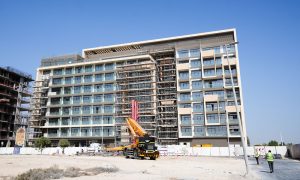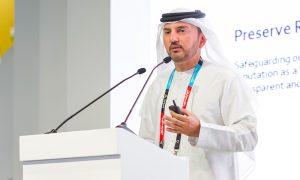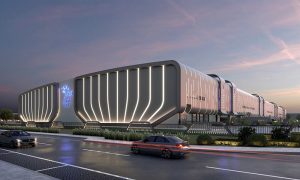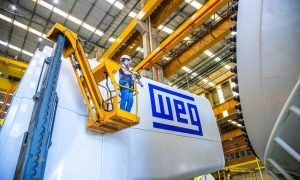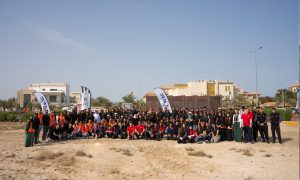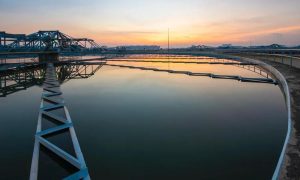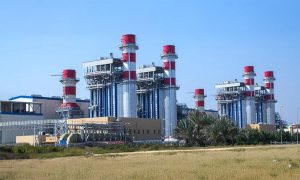Ain Dubai wheel rim installation passes halfway mark
Five of eight 107-metre sections of wheel rim have been installed, developer Meraas says
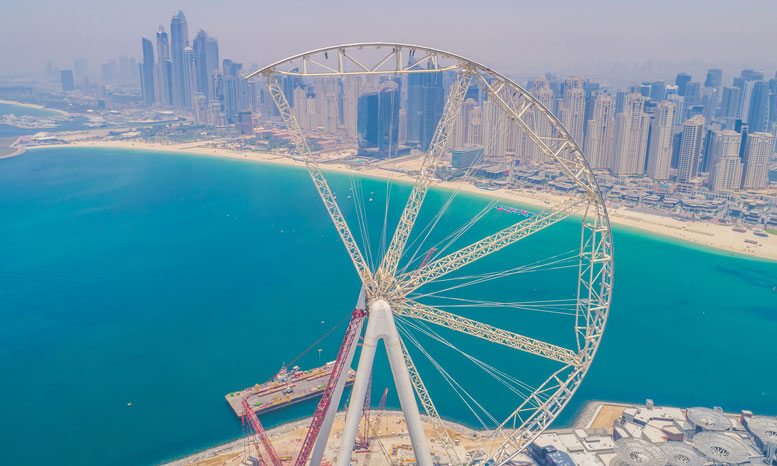
Meraas, the Dubai-based real estate developer, has announced that a significant milestone has been reached in the construction of Ain Dubai, the world’s largest and tallest observation wheel, following the successful installation of the fifth of eight 107-metre sections of its wheel rim.
Standing more than 210-metres tall, Ain Dubai eclipses the 167-metre High Roller in Las Vegas, and the 190-metre New York Wheel, which is planned for Staten Island. The hub and spindle of the wheel were set in place last year, and the final structure will include more than 9,000 tonnes of steel, which is almost 25% more than the amount of iron used to construct the Eiffel Tower in Paris.
“Ain Dubai reflects our ambition of creating new destinations that contribute to His Highness Sheikh Mohammed bin Rashid Al Maktoum, Vice President and Prime Minister of UAE and Ruler of Dubai, vision of a city where people are encouraged to create, explore and enjoy,” said Abdulla Al Habbai, group chairman of Meraas in a statement.
“The destination is designed to bring people together from around the world and will enhance Dubai’s reputation as a leading choice for business and leisure travellers. It also embodies the pioneering and innovative nature of a city that has pushed the boundaries of modern engineering.”
Once completed, Ain Dubai will become a destination that will offer visitors and residents 360-degree views of the city of Dubai and its coastline.
All eight sections of the rim have been manufactured using the highest-grade German and Korean steel and individually shipped to Ain Dubai by barge. They are manoeuvred into position in a complex operation by a team of engineers and technicians using cranes with a lifting capacity of 3,000 tonnes.
The wheel rim sections are connected to the hub and spindle by a total of 192 heavy-duty cables, each of which is comprised of over a hundred separate wires that are pre-tensioned with up to 300 tonnes of force. These cables will eventually support the combined 7,500 tonne weight of the rim and its capsules.
“The assembly of the rim at Bluewaters is one of the most exciting phases in the construction of Ain Dubai, as it marks the arrival of the centrepiece of the island and another addition to Dubai’s impressive skyline – one that creates a new meeting point for the city and economy, as well as an open place for people to share many new experiences together,” said Omar Delawar, chief projects officer at Meraas.
“With the first five sections of the wheel rim already connected to the hub, two winch devices have been fitted to rotate the wheel in a way that will allow Ain Dubai to receive the sixth, and subsequent sections of the wheel rim. Each rim section weighs roughly the same as two Airbus A380 aircraft and must be rested on five temporary support structures connected to the hub, as well as two 115-metre spokes”.
With construction of the wheel rim well underway, Abdulla Al Habbai has led a delegation to Switzerland, where Ain Dubai’s 48 high-tech passenger capsules are being manufactured by Swiss Rides on behalf of the project’s main contractor, Hyundai.
The 30-square-metre double-glazed capsules is designed to comfortably accommodate 40 passengers and are clad in high-quality glass with ultraviolet and infrared protection like the glassmaking technology used to produce military aircraft canopies. This process will ensure maximum light and visibility.
Capsules will have the flexibility to be converted into fine dining destinations for up to 12 guests, while six Premium Capsules will also offer an upscale service with a licensed bar that will result in a unique new culinary experience.
Smart climate control will also ensure a comfortable ride, whilst LED screens will offer information about the spectacular views on offer. Two motors, located under the floor of the capsules, will ensure stability and a smooth ride as the wheel rotates.
The capsules are expected to be installed in 2018, Meraas added.
